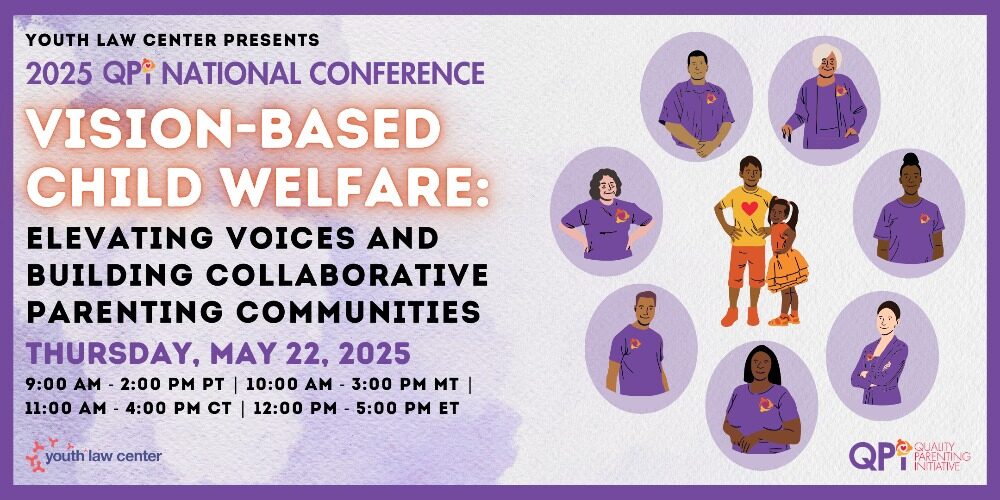On any given day, nearly 400,000 children are in the U.S. foster care system, many after experiencing abuse, neglect, or family crises. We all agree: children should remain safely with their families whenever possible, and families should be supported to care for their children. But when foster care is necessary, children must receive the love, care, and stability of a family who can help them heal and thrive.
Despite this goal, our foster care system too often fails to meet children’s developmental needs. At the Youth Law Center (YLC), we are tackling the root causes of this failure while leading a bold, transformative vision: a foster care system where every child can emerge whole, supported, and ready to thrive.
As we mark National Foster Care Month this May, we’re highlighting key advocacy efforts from our Quality Parenting Initiative (QPI) – a national advocacy strategy and network to ensure children in foster care receive the loving, effective parenting they need to grow and heal. QPI brings together child welfare agencies, courts, advocates, youth, birth and resource families to co-create policies and practices grounded in child development and real-life experience.
“Every time I was moved, it felt like I had to start my whole life over, new rules, new faces, and no one who really knew me. I wasn’t just changing homes; I was losing pieces of myself.” – Elizabeth Clews
One critical issue QPI sites have identified across the country is the trauma children experience when they move between homes – even when the move is ultimately positive, such as reunification or connection with relatives. These transitions, when poorly planned or rushed, cause harm: they disrupt trust and attachment, sever important relationships, interrupt education and health care, and compound existing trauma. The consequences are deep and long-lasting, affecting mental health, development, and future stability. And they contribute to widespread systemic challenges like resource parent attrition, placement breakdowns, and failed reunifications or guardianships.
To confront this harm, several California QPI counties – such as Fresno and San Diego – have pioneered developmentally sensitive transition policies. These practices center the child and require collaborative, child development-informed planning involving birth families, resource families, and youth. They address critical factors like timing, transportation, emotional preparation, continuity of care and education, and opportunities to say goodbye. They also prioritize maintaining essential relationships – before, during, and after the move.
These locally led innovations, which amplify QPI’s vision of creating a child-centered approach in foster care, have now led to a groundbreaking statewide policy initiative.
“Most of the time, the moves came without warning. One minute you’re at school or eating dinner, and the next, you’re packing up your life. No goodbyes, no time to hold on to anything. I lost my culture coming into care, my food, my language, the stuff that made me feel loved. And with every new placement, I lost more, including my friends.” – Leo V.
Assembly Bill 896 (Elhawary), co-sponsored by the Youth Law Center and the County Welfare Directors Association of California, would require each county child welfare agency to create its own child-centered, developmentally informed transition policies. These policies must be designed with input from youth and families and include clear steps to protect relationships, plan thoughtfully, and maintain the continuity children need during a transition. The bill also tasks the California Department of Social Services with sharing best practices from QPI sites to guide this work across the state.
AB 896 reflects what youth and families have long demanded: thoughtful, healing transitions that preserve relationships and promote well-being. It’s a concrete example of how QPI’s collaborative, research-based, and youth and family informed approach can translate into real, systemic change. Moreover, QPI sites in California, Nevada Connecticut and Florida that have prioritized new transition planning policies all agree transitions that are planned, thoughtful and child-centered reduce the trauma of transitions, support the retention of foster families, increase the chances of success in reunification, and lead to better immediate and long term outcomes for the child.
As AB 896 moves through the California Legislature, we look forward to keeping you informed – and to continuing to work together to build a foster care system where every child is seen, supported, and surrounded by love.
Join the 2025 QPI National Virtual Conference on May 22

Join us on Thursday, May 22, at 9:00 AM PT for “Vision-Based Child Welfare: Elevating Voices and Building Collaborative Parenting Communities,” QPI’s 12th Annual Virtual National Conference focused on transforming child welfare through shared leadership and collaboration.
True change happens when youth, parents, caregivers, professionals, and communities unite around a vision of love, connection, and healing. Grounded in research on stakeholder engagement, this event highlights the power of elevating voices, building partnerships, and shifting to relationship-centered practices.
Through dynamic discussions, research reviews, and innovative strategies, we’ll explore how to create lasting collaborative parenting communities and ensure that love, parenting, and relationships are prioritized for every child in out-of-home care.
